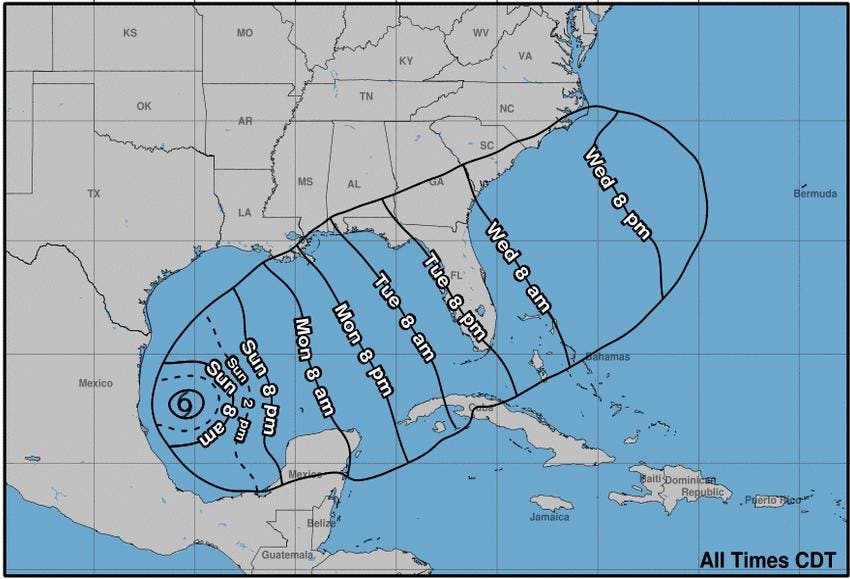Tropical Storm Milton is expected to strengthen into a hurricane on Sunday and make landfall in Florida midweek.
NOAA
A week after Hurricane Helen carved a path of death and destruction across the Southeast, another potentially dangerous storm is headed toward the Sunshine State.
Tropical Storm Milton is currently moving northeast through the Gulf of Mexico at 3 mph with sustained winds of 40 mph, heading toward the west coast of Florida, and is expected to make landfall as a hurricane midweek.
“Milton is expected to remain in the southwestern Gulf of Mexico through Sunday night, move across the southcentral Gulf on Monday and Tuesday, and approach the west coast of the Florida peninsula by midweek,” the hurricane center said at 5 p.m. ET. Time) announced. recommended. “Milton is expected to become a hurricane Sunday night and could become a major hurricane as it moves through the central and eastern Gulf of Mexico.”
The Department of Transportation requires all airlines to provide refunds to customers when flights are canceled or significantly delayed for reasons within the airline’s control. However, this rule does not apply to delays or cancellations due to weather.
Milton is expected to hit Florida’s Gulf Coast as a hurricane on Tuesday.
NOAA
Tropical Storm Milton: Airline Travel Advisory
Ahead of the storm’s landfall, major U.S. airlines had already issued travel waivers allowing passengers flying to and from affected airports to rebook without paying fare differences. For consumers looking to change their travel plans or recover travel expenses, a lot depends on the airline, itinerary and, in some cases, whether you have travel insurance.
United Airlines has issued a travel alert affecting five airports in Florida. Passengers who purchased tickets before Friday, October 4th for flights traveling to, from, or through the listed airports from Monday to Thursday, October 7th to 10th, will be eligible for travel by Thursday, October 17th. You can rebook with no change fee.
(Other airlines also plan to issue warnings around the time the storm makes landfall.)
Tropical Storm Milton: How to avoid flight disturbances this week
Are you going on a plane this week? There are many things you can do to minimize your chances of getting mired in a flight delay or cancellation.
Most flight disruptions are caused by weather issues. By referring to NOAA’s National Forecast Map, you can be aware of potential trouble up to three days before your flight. Hovering over Day 1, Day 2, and Day 3 will predict the weather for today, tomorrow, and the day after tomorrow. See at a glance where rain, thunderstorms, and other severe weather is expected on your travel date.
Having this information ready will allow you to plan for better scenarios by changing dates and routes. Perhaps you can move your trip forward or late by a day or change your connecting flight to avoid the problem area.
Even if you aren’t traveling to Florida this week, your flight may be affected. Because airlines reuse planes for multiple flights each day, weather events in one part of the country can cause disruption throughout the country. Planes delayed on previous routes often do not arrive on time at late-night departure airports. For example, a plane stuck in Orlando at 1 p.m. might not be able to make it to Chicago for a 4:15 p.m. departure. There is a domino effect where one delay causes another.
If possible, book the earliest flight of the day to minimize potential disruptions. Afternoon or evening flights are more likely to be delayed than early morning flights.
On the day of your flight, check your airline’s app for flight notifications. In the flight tracking app FlightAware, enter your flight information and click on a specific flight. Then click “Where is my plane now?” Click on the link below the flight number. You can see if your plane is ahead of schedule, on time, or behind schedule and act accordingly. This is often even before the airline announces a delay or cancellation.

